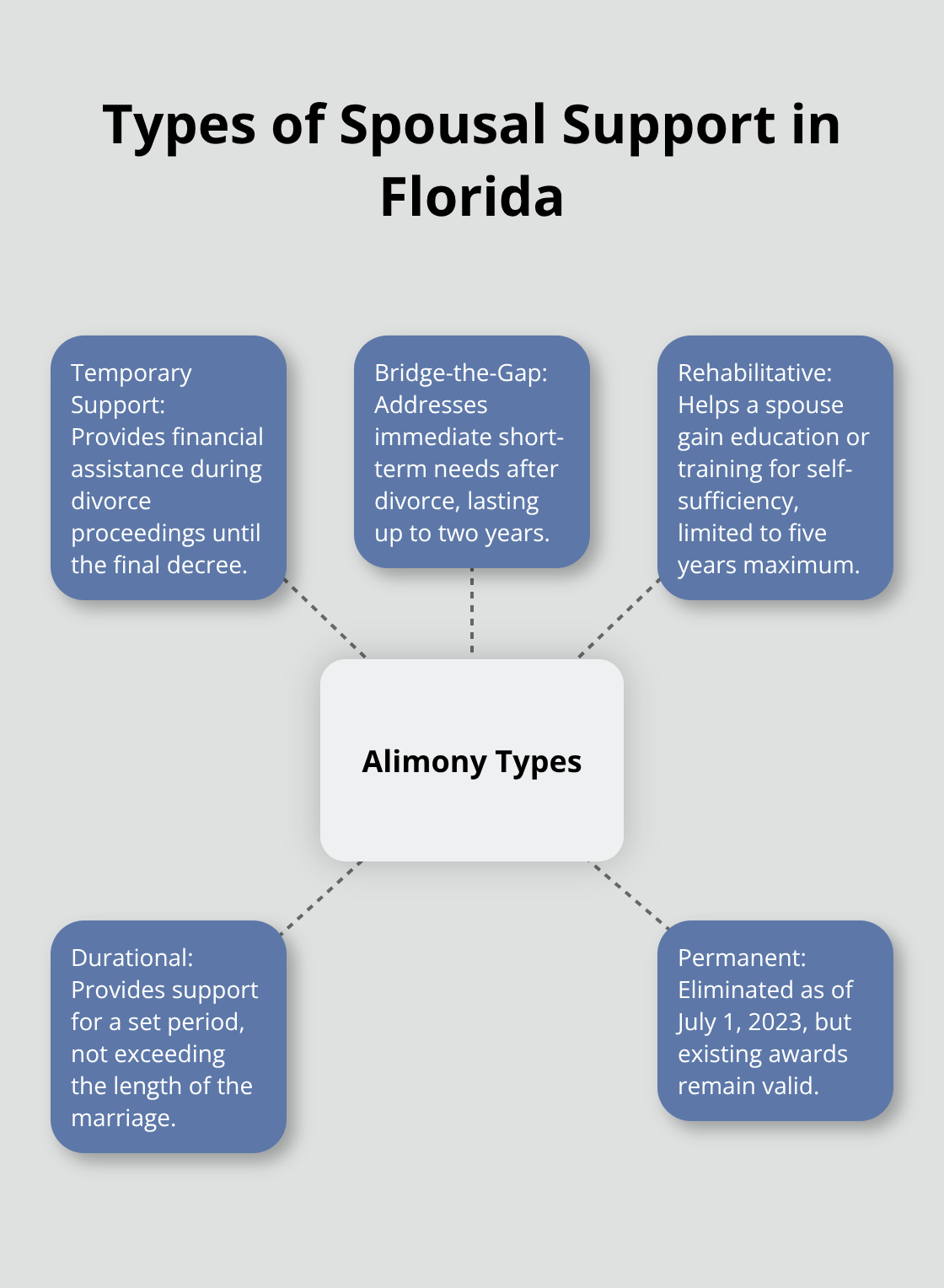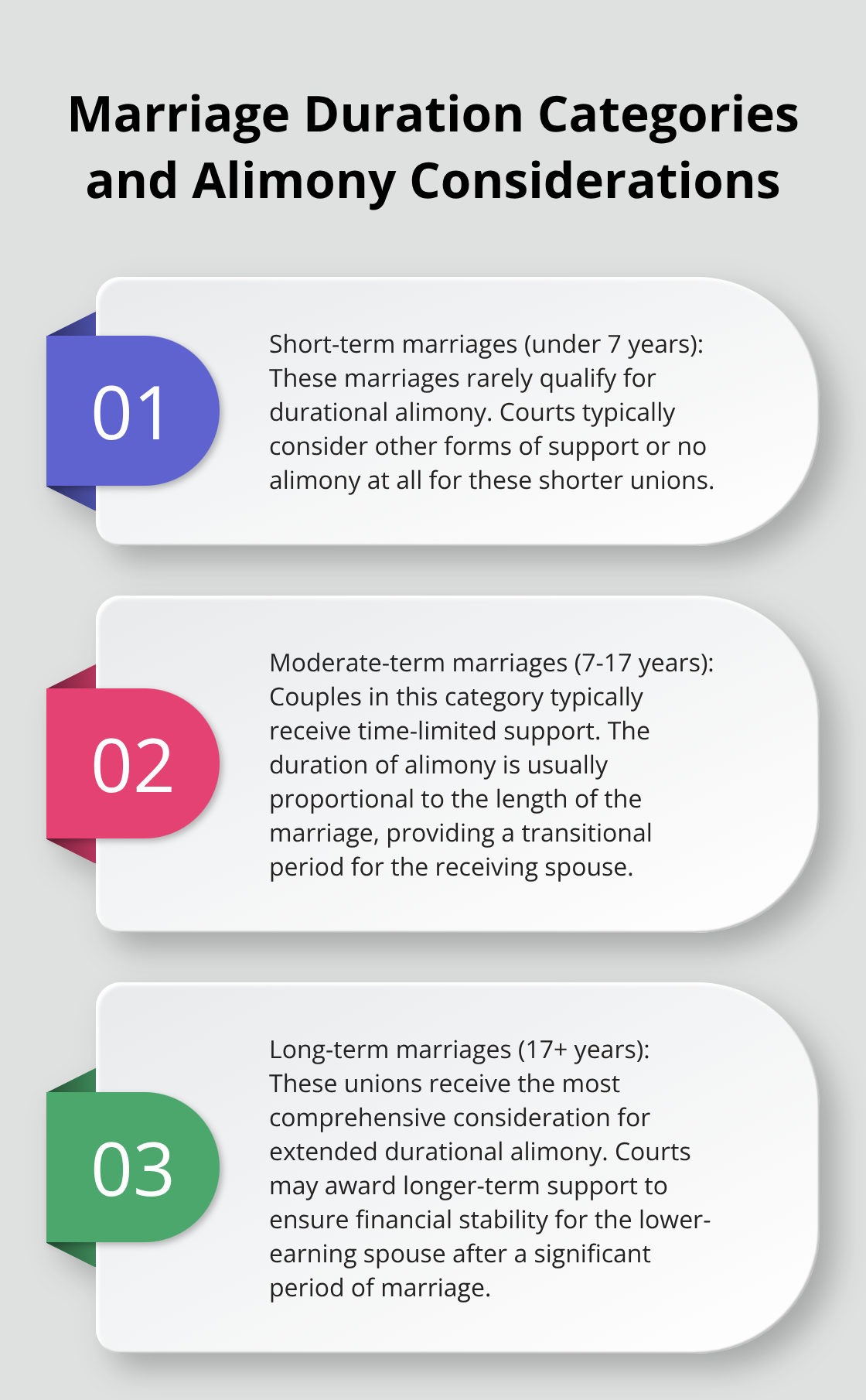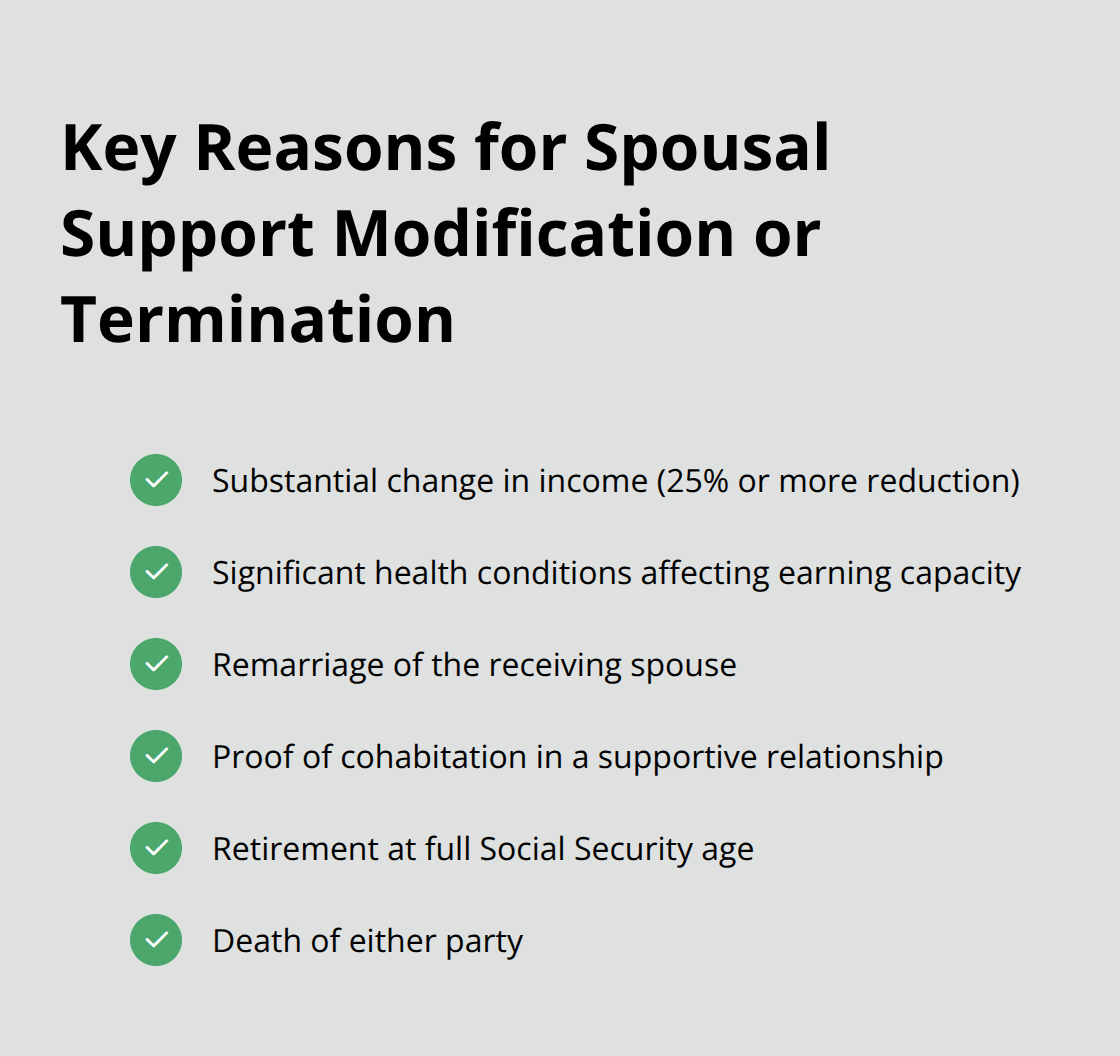Spousal Support in Melbourne Florida
Our Blog
Spousal Support in Melbourne Florida

Spousal support in Melbourne, Florida follows specific state guidelines that determine payment amounts and duration. Florida courts consider multiple factors when awarding alimony, from marriage length to each spouse’s financial capacity.
We at Harnage Law PLLC see how these decisions impact families throughout Brevard County. Understanding your options can help you navigate this complex legal process more effectively.

Types of Spousal Support in Florida
Temporary Support During Divorce
Florida recognizes several alimony types: bridge-the-gap, rehabilitative, durational, and permanent, each designed for specific situations during and after divorce. Temporary alimony supports the lower-earning spouse throughout divorce proceedings until the final decree. This type stops automatically when the court finalizes the divorce.
Bridge-the-Gap Alimony
Bridge-the-gap alimony addresses immediate short-term needs after divorce, lasting no more than two years and helping with transitional expenses like securing housing or transportation. The court cannot modify this type once awarded. This support helps spouses transition from married life to independence without extended financial dependence.
Rehabilitative Support for Career Development
Rehabilitative alimony helps a spouse gain education, training, or work experience needed for self-sufficiency. Florida limits this support to five years maximum, requiring a specific plan that shows how the recipient will achieve independence. Courts review these plans carefully to verify realistic goals and timelines.
Durational Alimony Terms
Durational alimony provides support for a set period that cannot exceed the marriage length. For marriages under seven years, courts rarely award durational alimony. Marriages lasting seven to seventeen years may receive durational support, while unions of seventeen years or more qualify for longer terms.
Changes to Permanent Alimony Laws
The elimination of permanent alimony took effect July 1, 2023, under Senate Bill 1416 (signed by Governor DeSantis). Existing permanent alimony awards remain valid, but new cases cannot receive this type of support. Courts now focus on durational alimony for long-term marriages, calculating payments based on the recipient’s reasonable needs or thirty-five percent of the income difference between spouses, whichever amount is lower.
Understanding these support types helps you prepare for court proceedings, but courts must evaluate specific factors when determining which type applies to your situation.
Factors Courts Consider When Determining Spousal Support
Florida courts classify marriage duration through specific categories that directly impact support awards. Short-term marriages under seven years rarely qualify for durational alimony, while moderate-term unions of seven to seventeen years typically receive time-limited support. Long-term marriages of seventeen years or more receive the most comprehensive consideration for extended durational alimony.

Marriage Duration and Living Standards
Courts examine the standard of living that parties established during marriage, which requires detailed financial records that show monthly expenses, housing costs, and lifestyle patterns. The court must verify both the requesting spouse’s genuine need and the paying spouse’s ability to provide support. Documentation becomes critical when courts evaluate whether one spouse can maintain their previous lifestyle without assistance.
Complete Financial Picture Assessment
Courts examine all financial resources including non-marital assets, investment income, and earning potential rather than just current salaries. The evaluation process considers retirement accounts, property values, and business interests that either spouse owns. Courts also review debt obligations and monthly expenses to determine the true financial capacity of both parties.
Age and Health Considerations
Age significantly affects these determinations, with spouses over fifty receiving greater consideration for longer support periods due to reduced career advancement opportunities. Health conditions that limit earning capacity carry substantial weight and require medical documentation plus vocational assessments. Physical or mental impairments that prevent full-time employment often result in higher support awards or extended payment periods.
Non-Financial Contributions Matter
Non-monetary contributions like homemaking, child-rearing, and supporting a spouse’s career advancement receive equal consideration with financial contributions. Courts recognize that one spouse may have sacrificed career opportunities to support the family or the other spouse’s professional growth. These contributions often justify support awards even when the requesting spouse has some earning capacity.
Tax Impact on Final Awards
Tax implications under current federal law mean alimony payments are neither deductible for payors nor taxable income for recipients (effective for divorces finalized after December 31, 2018). This change affects the actual cost and benefit calculations that influence final award amounts. Courts must now consider the after-tax impact when they structure support payments, which often leads to different award calculations than in previous years.
How to Modify or Terminate Spousal Support Orders
Spousal support modifications require substantial changes in circumstances that courts can verify through documentation. Florida law demands specific evidence that shows material changes in income, health, or life situations that make current payments unreasonable or unnecessary. Courts reject modification requests based on minor income fluctuations or temporary hardships – the change must be significant and permanent.

Automatic Termination Events
Remarriage of the spouse who receives support automatically ends all types of alimony except bridge-the-gap support, which continues regardless of remarriage. Cohabitation presents more complex challenges since Florida requires proof of a supportive relationship rather than simple arrangements where people live together. Courts examine shared expenses, joint bank accounts, and the duration of cohabitation when they determine whether to reduce or terminate payments. Death of either party immediately ends all alimony obligations (which makes life insurance requirements common in support orders).
Income and Retirement Changes
Retirement at full Social Security age provides strong grounds for modification, particularly when retirement income drops significantly below work wages. Courts evaluate retirement plans, pension benefits, and Social Security payments to determine appropriate adjustments. Involuntary job loss or disability creates modification opportunities, but voluntary career changes receive less favorable treatment. Income increases for the spouse who pays rarely justify higher payments unless the original order specifically included escalation clauses.
Court Process for Modification Requests
Modification petitions must demonstrate substantial changes through financial affidavits, tax returns, and documentation within the same case number as the original divorce. Courts schedule hearings where both parties present evidence about changed circumstances (which makes legal representation valuable for successful outcomes). The party who requests the modification bears the burden of proof to show substantial change occurred, and filing fees typically range from two hundred to four hundred dollars depending on the petition type.
Final Thoughts
Spousal support Melbourne Florida cases demand careful attention to multiple alimony types and complex legal requirements. Bridge-the-gap support addresses immediate transitional needs, while rehabilitative alimony helps spouses develop career skills for independence. Durational alimony provides time-limited assistance, and the recent elimination of permanent alimony changes how courts approach long-term marriages.
Courts evaluate numerous factors including marriage duration, financial resources, health conditions, and non-monetary contributions when they determine appropriate support awards. Modification requests demand substantial evidence of changed circumstances (which makes proper documentation vital for successful outcomes). The burden of proof falls on the party who seeks the modification.
We at Harnage Law PLLC understand how spousal support decisions affect families throughout Brevard County. Our attorneys provide personalized attention and strategic counsel for divorce and family law matters. Whether you need to establish, modify, or contest support orders, professional legal representation protects your financial interests and helps achieve favorable results in these complex proceedings.
